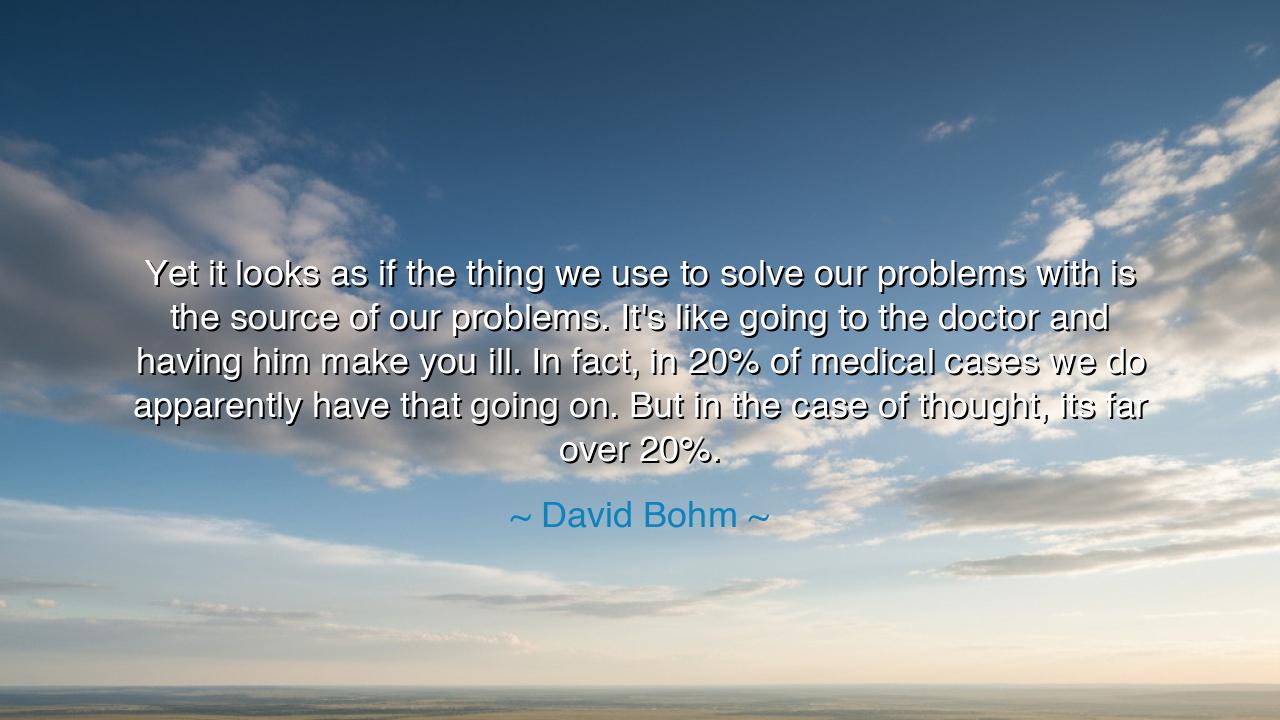
Yet it looks as if the thing we use to solve our problems with is
Yet it looks as if the thing we use to solve our problems with is the source of our problems. It's like going to the doctor and having him make you ill. In fact, in 20% of medical cases we do apparently have that going on. But in the case of thought, its far over 20%.






In the words of David Bohm, the physicist and philosopher of mind, there resounds a paradox of profound depth: “Yet it looks as if the thing we use to solve our problems with is the source of our problems. It’s like going to the doctor and having him make you ill. In fact, in 20% of medical cases we do apparently have that going on. But in the case of thought, it’s far over 20%.” These words strike not only at the root of knowledge but at the heart of human existence, for they reveal the double-edged nature of the very faculty we most trust—our power to think.
Bohm points to thought as both healer and disease. Humanity, armed with reason, has built civilizations, discovered the laws of nature, cured illnesses, and reached the stars. Yet the same thought breeds division, conflict, and despair. We invent weapons with the same minds that invented medicine. We justify greed with the same logic that defends justice. Like the doctor who inadvertently makes the patient sick, the mind often produces fresh problems in the very act of trying to solve old ones. What was meant to liberate us becomes a snare of our own design.
The example of medicine illustrates this clearly. There are times when a cure brings side effects, when one ailment is exchanged for another, unintended and unforeseen. In the same way, our thoughts often carry hidden assumptions—beliefs about self, about others, about the world—that, while meant to guide us, actually blind us. Prejudices, fears, and rigid ideas may once have served as survival tools, but carried forward, they poison the well of reason. Bohm’s insight is that this error is not rare; it is the rule. Far more than 20% of the time, our thoughts are the hidden architects of our suffering.
History bears grim witness to this truth. Consider the Cold War, when nations, each guided by the logic of security, built arsenals of nuclear fire so vast that their very existence endangered all life on Earth. Each side believed its thoughts were solving the problem of survival, yet in truth, those very thoughts magnified fear and nearly brought destruction. The solution became the problem. So too in countless wars, revolutions, and conflicts, we see the same cycle: thought, unexamined, breeds the crises it claims to heal.
Yet Bohm’s teaching is not despair, but a call to vigilance. He reminds us that thought is not infallible. It is a tool, powerful but flawed, and it must be seen for what it is. Just as a wise patient seeks second opinions and questions the treatments given, so must we question our own assumptions. We must ask: “Is this solution creating another problem? Is my thinking clear, or is it tainted by fear, pride, or habit?” In this questioning lies the beginning of freedom.
The deeper meaning of Bohm’s words is humility. Too often we worship our minds as gods, believing that thought alone can solve every difficulty. But Bohm warns us that unchecked thought, like unchecked medicine, can turn toxic. True wisdom is not to abandon thought, but to see its limits, to balance it with awareness, with compassion, with silence. For sometimes the answer is not more thinking, but the stillness that allows new insight to emerge beyond old patterns.
The lesson is clear. Do not blindly trust every conclusion your mind produces. Examine it as you would a prescription from a physician: ask what side effects it may carry, what unseen assumptions lie within. Cultivate practices that bring clarity—reflection, dialogue, even meditation—to loosen the grip of rigid thinking. And in this way, your mind, once the source of suffering, can again become the servant of truth and life.
Thus David Bohm’s words stand as a beacon to future generations. They remind us that the mind, like fire, can warm or destroy, can heal or wound. Respect it, question it, refine it—but do not let it rule unexamined. For when thought is humbled and illuminated, it ceases to poison, and once more becomes what it was meant to be: the bridge between humanity and the vast order of the universe.






AAdministratorAdministrator
Welcome, honored guests. Please leave a comment, we will respond soon